Invited Speakers
Trillium Health Partners' Insight Health Solutions and Wounded Warriors Canada would like to extend our gratitude to all the speakers for their valuable contributions to the Ontario First Responders’ Mental Health Conference. Without their support, this conference would not be possible.
Keynote Address
Plenary Speakers
Workshop Sessions
Thomas CarriqueOntario Provincial Police Commissioner
Ontario Provincial Police
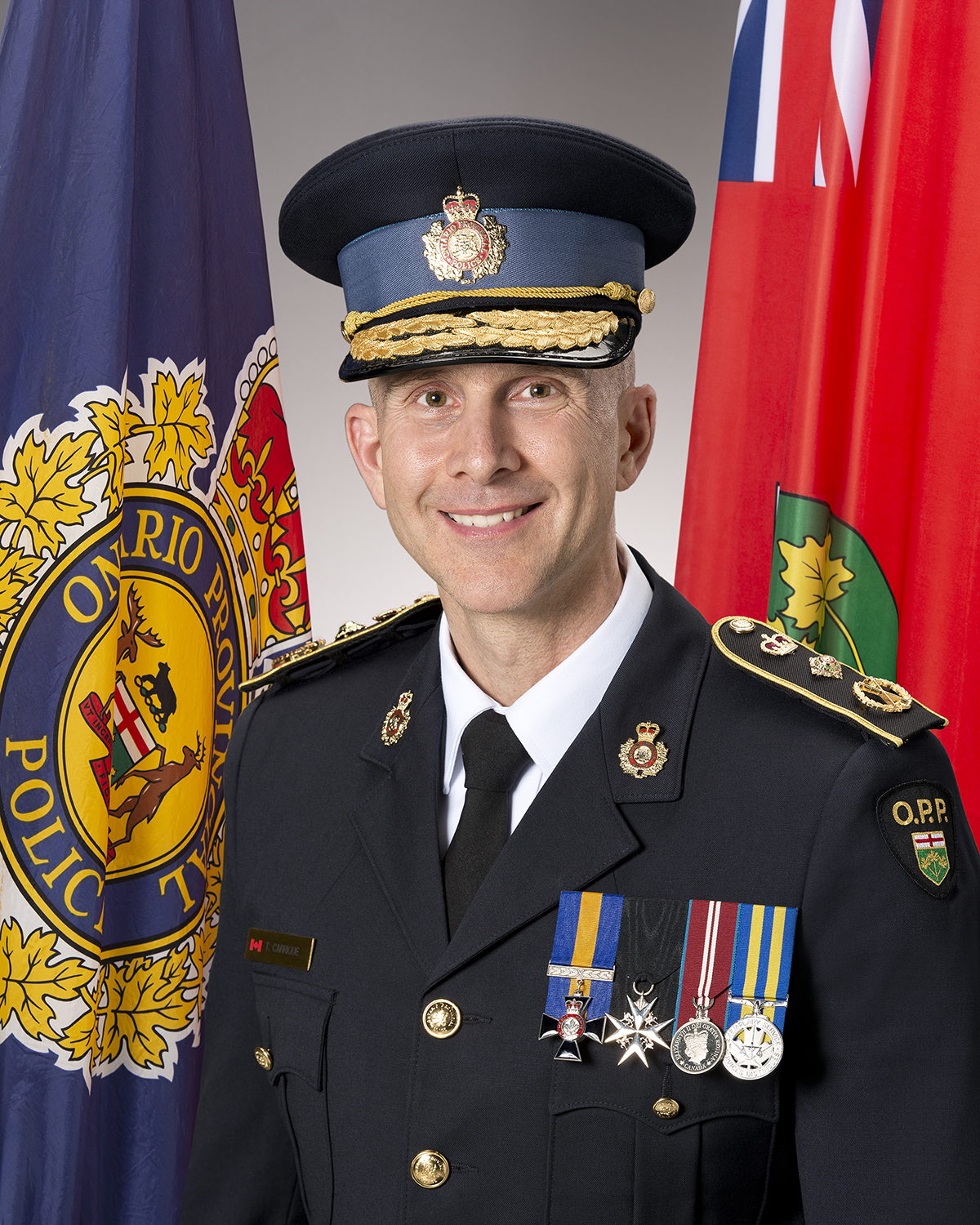
Thomas Carrique became the 15th Commissioner of the Ontario Provincial Police on April 8, 2019. Commissioner Carrique commenced his policing career with York Regional Police in 1990. He worked in a variety of roles including Uniform Patrol, Criminal Investigations, Investigative Services, Traffic, Marine, and Public Order. He progressed through the ranks and served as Deputy Chief of the Administration Branch, the Operations Branch, and the Investigations and Support Branch.
Commissioner Carrique holds a Master's degree in leadership and training, with a specialty in justice and public safety, from Royal Roads University, and a certificate in terrorism studies from the University of St. Andrews in Scotland. He is a graduate of the National Policing Improvement Agency's International Commanders Program in the United Kingdom and the United States Department of Justice Drug Unit Commanders Academy. He is currently a co-chair of the Criminal Intelligence Service Canada National Executive Committee and he serves on the board of directors for the Canadian Association of Chiefs of Police and the Ontario Association of Chiefs of Police. In addition, he is an appointed member of the International Association of Chiefs of Police, Division of State and Provincial Police Executive Committee.
Commissioner Carrique is a recipient the Police Exemplary Service Medal and the Queen Elizabeth II Diamond Jubilee Medal. He is also an Officer of the Order of Merit of the Police Forces as well as a Serving Brother of the Order of St. John Ambulance.
Keynote Address
Lieutenant-General (ret'd) The Honorable Roméo A. DallaireO.C., C.M.M., G.O.Q., M.S.C., C.D.
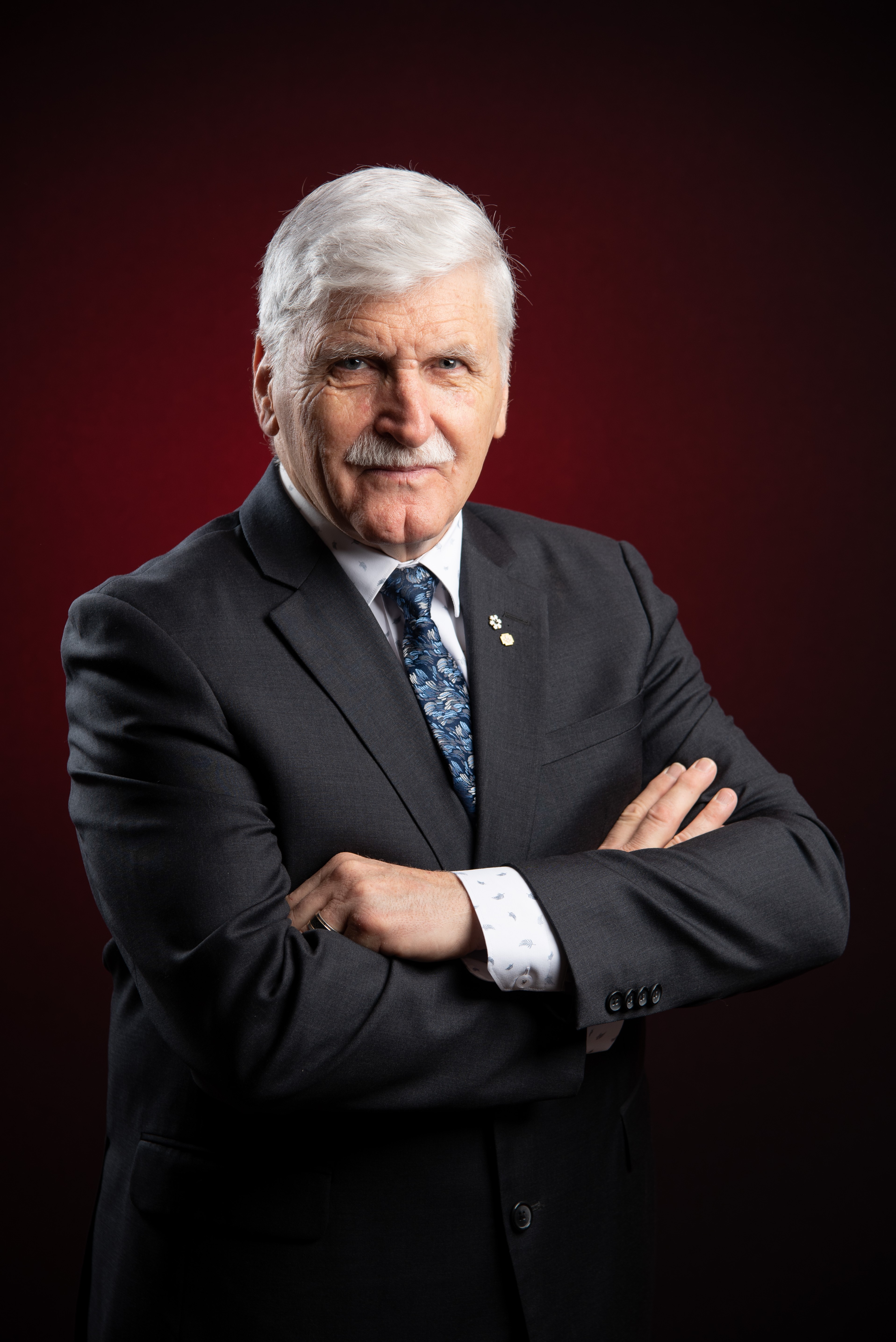
General Roméo Dallaire has been a vocal advocate for injured veterans and first responders for over two decades. He is also a highly-respected author, international advisor, and former Canadian Senator. Throughout his distinguished military career, General Dallaire most notably served as Force Commander of the United Nations Assistance Mission for Rwanda prior to and during the 1994 genocide. General Dallaire provided the United Nations with information about the planned massacre, which ultimately took more than 800,000 lives in less than 100 days; yet, permission to intervene was denied and the UN withdrew its peacekeeping forces. General Dallaire, along with a small contingent of Canadian, Ghanaian, and Tunisian soldiers and military observers, disobeyed the command to withdraw. They believed they had a moral obligation to stay, to help where they could, and to -- at the very least -- bear witness to what the rest of the world chose to turn its back.
General Dallaire's 1997 revelation that he suffered from Post-Traumatic Stress Disorder as a direct result of his mission for Rwanda paved the way for destigmatizing this potentially-lethal Operational Stress Injury among military veterans as well as first responders. Though it led to his being medically released from the Canadian Army in 2000, he has devoted decades of passionate leadership and advocacy to the issue on behalf of other veterans struggling with PTSD, including the publication of his bestselling memoir: Waiting for First Light: My Ongoing Battle with PTSD.
Roméo Dallaire continues to work tirelessly to bring national and international attention to situations too-often ignored, whether the prevention of mass atrocities, the recruitment and use of children in armed conflict, or the impact of post-traumatic stress disorder on veterans, first responders and their families. He has served as National Patron of Wounded Warriors Canada since 2013.
Keynote Address: Mental Health | Invisible Wounds
Bearing witness to the horrors of genocide, and an international community's disregard for humanity, General Dallaire was grievously injured with post-traumatic stress disorder, resulting in his medical release from the military in 2000. Since then, he has tirelessly worked to raise awareness about mental health issues and PTSD. Dallaire's courage in going public about his own experience gives him undeniable credibility on the issue. This presentation will inspire audiences to break the stigma around mental health. Speaking with compassion and insight, Dallaire makes clear how the challenges around mental illness affect us all. As mental health wounds are not always visible, Dallaire speaks passionately about how much more needs to be done so that those suffering in silence can not just survive, but thrive.
Dr. Nadia Aleem, MD, MHSc CCFP, FRCP, Mental Health Lead
Insight Health Solutions, Trillium Health Partners

Dr. Nadia Aleem initially worked as a Family Medicine Doctor and Addictions Physician prior to retraining and starting her work as a Psychiatrist. She is currently the Mental Health Lead Physician at Insight Solutions, Trillium Health Partners and was formerly the Medical Head at the Work Stress and Health Program at the Centre for Addiction and Mental Health. Nadia works exclusively in the field of Occupational Psychiatry, specializing in disability management and providing consultation and education on workplace mental health policies. She is an Assistant Professor at the University of Toronto and provides education seminars to organizations and medical training programs across Canada.
Plenary Panel Session: Supporting Mental Health of our First Responder Leaders - Leadership to the Frontlines
The purpose of this panel discussion is to explore some of the particular concerns relating to leadership and frontline workers across First Responder Organizations. The panel we discuss potential strategies for addressing mental health concerns in both populations as well as mitigating risks.
Dr. Nick Carleton Ph.D., R.D. Psychologist
Canadian Institute for Public Safety Research and Treatment
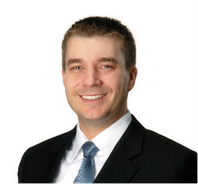
R. Nicholas Carleton, Ph.D. is a Professor of Clinical Psychology at the University of Regina, a registered clinical psychologist in Saskatchewan, and is currently serving as the Scientific Director for the Canadian Institute for Public Safety Research and Treatment. He has published more than 200 peer-reviewed articles and book chapters exploring the fundamental bases of anxiety and related disorders. He has completed more than 400 national and international conference presentations. He also serves as an active member of several national and international professional associations. As principal or co-principal investigator he has been awarded more than $60M in competitive external funding. He has received several prestigious awards and recognitions, including recent induction as a Member of the Royal Society of Canada's College of New Scholars, Artists and Scientists, and as a Fellow of the Canadian Academy of Health Sciences, and was awarded the 2020 Royal-Mach-Gaensslen Prize for Mental Health Research. Dr. Carleton is actively involved in clinical and experimental research, with his interests including the biopsychosocial measurement, assessment, and treatments of trauma and anxiety, focusing on transdiagnostics and fundamental cognitions. He currently serves as principal investigator on the RCMP Longitudinal PTSD Study (www.rcmpstudy.ca), the associated extension study for Saskatchewan public safety personnel (www.saskptsistudy.ca), and co-principal investigator on the Federal Internet Cognitive Behavioral Therapy Program for public safety personnel (www.PSPSNET.ca).
Plenary Session: Supporting the Mental Health of Public Safety Personnel: a Message from the Canadian Institute for Public Safety Research and Treatment (CIPSRT)
Public safety personnel (PSP; e.g., border services personnel, correctional workers, firefighters, paramedics, police, public safety communicators) are frequently exposed to potentially psychologically traumatic events. Such events contribute to substantial and growing challenges from posttraumatic stress injuries (PTSIs), including but not limited to posttraumatic stress disorder. PSP also face organizational, operational, and systematic challenges that further impact their mental health. Addressing these challenges with evidence-based treatments and training has been hindered by stigma, occupational barriers, and a lack of research focused on supporting police. Accordingly, the Government of Canada has funded the Canadian Institute for Public Safety Research and Treatment (CIPSRT; www.cipsrt-icrtsp.ca) to help build better solutions. CIPSRT is the national institute dedicated to PSP. CIPSRT provides the knowledge exchange network for information and resources for PSP stakeholders including academics, researchers, clinicians, PSP, PSP leaders, PSP families, and policymakers. CIPSRT is also the home for PSPNET (www.pspnet.ca), which provides PSP with tailored internet-delivered cognitive behavioural therapy. There are several other federally-funded initiatives associated with CIPSRT, such as efforts to build evidence-based proactive solutions for supporting federal (www.rcmpstudy.ca), provincial, and municipal (www.saskptsistudy.ca) PSP mental health. The presentation will contextualize challenges facing PSP, highlight several CIPSRT related projects, and present on selected peer-reviewed research results regarding PSP mental health. The presentation will conclude with a question and answer period, and offer opportunities for future connections.
Alison CockingBSc. PT, M.Ed., Managing Director
Insight Health Solutions, Trillium Health Partners
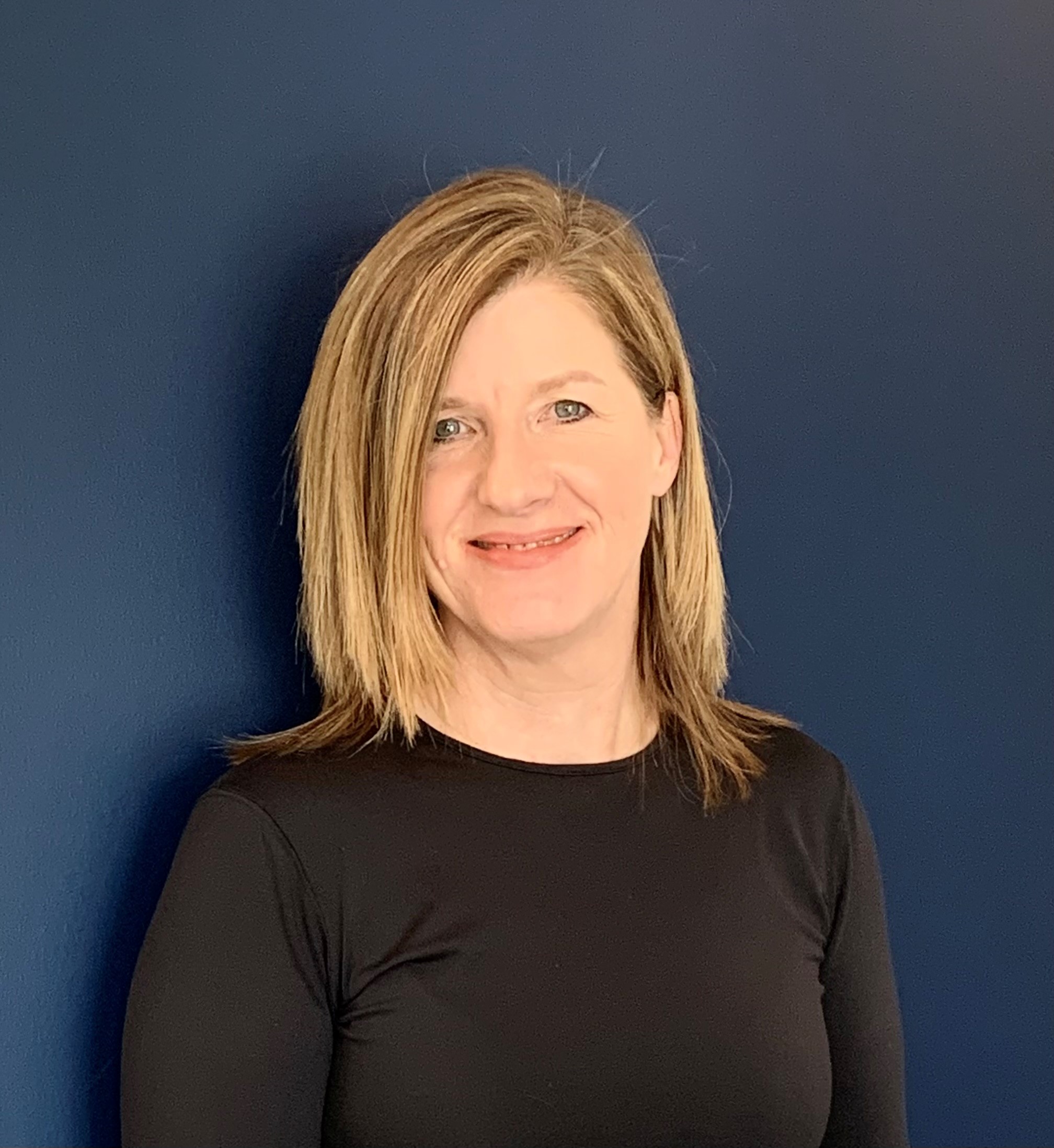
Alison Cocking is a strategic healthcare leader who serves as Trillium Health Partner's Managing Director, Insight Health Solutions, one of Canada's largest hospital-based disability management third-party programs. As a senior leader in the healthcare sector, Alison has over three decades of experience leading high functioning teams and programs in their delivery of impactful value-based quality services. The ability to financially contribute Insight's profits to the hospital's programs and services to help create a new kind of healthcare for a healthier community, is what drives and inspires her. Alison is a UK-trained Physiotherapist with a Master's degree in Education from the University of Toronto. An avid kayaker, hiker, traveler and general enthusiast of the great outdoors, Alison's goal is to have visited 100 countries by 2045.
Plenary Session: A look at the WSIB's First Responder Mental Health Speciality Pilot Program and the Employee Engagement Sessions that Shaped Today's Conference
The Workplace Safety and Insurance Board's (WSIB) First Responder Mental Health Pilot Specialty Program is an interprofessional program based on a stepped model of care, designed to provide effective and evidence-based care to Ontario's First Responders. The program is offered through Trillium Health Partners' (THP) Insight Health Solutions (IHS) as well as their partners: Ontario Shores Centre for Mental Health Services, EHN Gateway Recovery Centre, Woodstock General Hospital, and Wounded Warriors Canada. The goals of the program are to address the mental health impairments that impact return to work and function. A program review including outcomes and lessons learned will be presented as well as a summary of Insight Health Solutions recent engagement sessions with First Responder leaders.
Jeffrey FaheyPolice Sergeant
Nishnawbe Aski Police Service
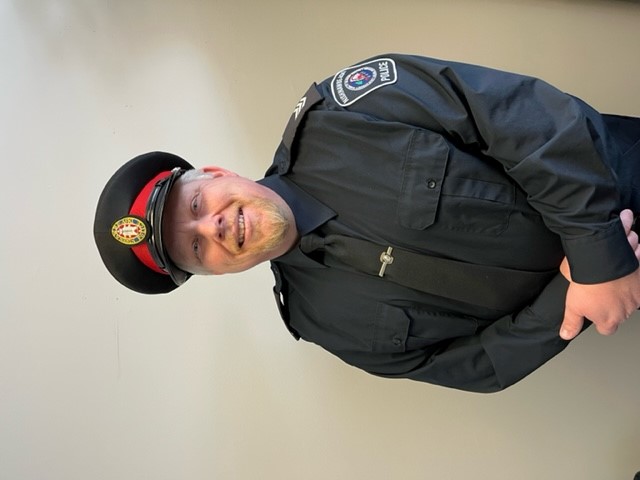
Sgt Jeffrey Fahey has been employed with the Nishnawbe Aski Police Service since 2002. He started his policing Career in Attawapiskat where he policed for 3 years. Sgt Fahey them transferred to Hearst and worked Constance Lake First Nation. 2 years later Sgt Fahey moved to a Crime Position and worked Major Cases for approximately 9 years. After promotion, Sgt Fahey went on to supervise communities in the far north. As of January 2021, Sgt Fahey started his Wellness Position for Nishnawbe Aski Police Service. Throughout his 20-years of service, Sgt Fahey has overcome many challenging situations and has gained valuable life experiences.
Plenary Panel Session: Supporting the Mental Health of our First Responders, Leadership to the Frontlines
The purpose of this panel discussion is to explore some of the particular concerns relating to leadership and frontline workers across First Responder Organizations. The panel we discuss potential strategies for addressing mental health concerns in both populations as well as mitigating risks.
Bruce KrauterEmergency Medical Services Chief
Essex-Windsor Emergency Medical Services
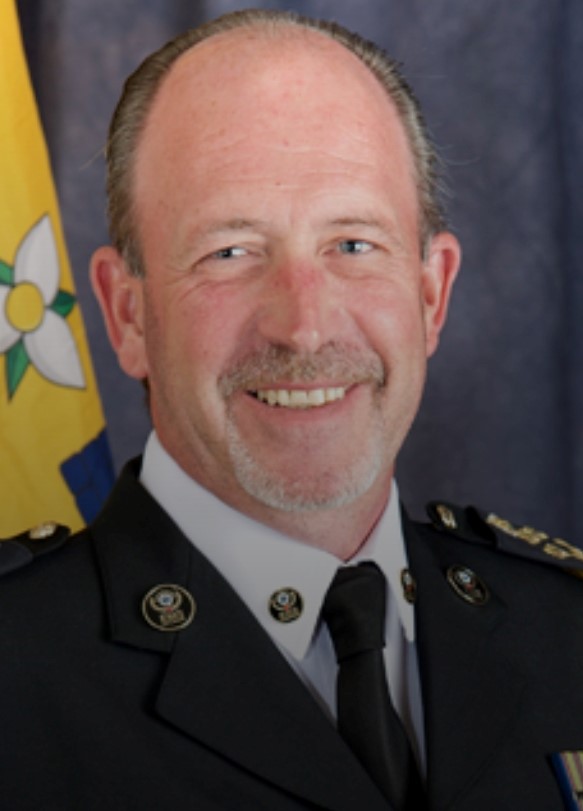
Chief Krauter began his career in Paramedicine with Windsor Provincial Ambulance in 1983 and progressed up through the ranks and was appointed Chief of Essex-Windsor EMS in July of 2014. Chief Krauter is an active member of the Ontario Association of Paramedic Chiefs (OAPC), the Paramedic Chiefs of Canada, St Clair College Paramedic Program Advisory Committee Chair and a member and participant of various other community groups and organizations.
He has an incredible passion for emergency medicine, pre-hospital care and his community. Beginning in 2011, he formalized the Public Access Defibrillator Program, assisted in the development of the #KnowYour911.ca campaign and developed and activated the Vulnerable Patient Navigator program in Windsor/Essex. All of which help to enhance the delivery of care, support and a better understanding of the emergency services to the residents of Windsor Essex.
Chief Krauter is currently the Chair of the “Ontario Paramedic Memorial Monument Organization”, a profound movement, giving recognition to those who have given the ultimate sacrifice while serving as Paramedics in Ontario. Additionally, he was instrumental in the development of the “Slip On Your Red Campaign”, in partnership with the Paramedic Chiefs of Canada and Wounded Warriors Canada. All of these organizations recognize and support the mental wellness of our soldiers, veterans, first responders and their families across Canada, Ontario and our local community.
Bruce was born and raised in Windsor, Ontario, now residing in Leamington, Ontario, married to Beth, and has two children, Morgan and Mitchell.
Plenary Panel Session: Supporting the Mental Health of our First Responders, Leadership to the Frontlines
The purpose of this panel discussion is to explore some of the particular concerns relating to leadership and frontline workers across First Responder Organizations. The panel we discuss potential strategies for addressing mental health concerns in both populations as well as mitigating risks.
Jeffery LangPresident and Chief Executive Officer
Workplace Safety and Insurance Board
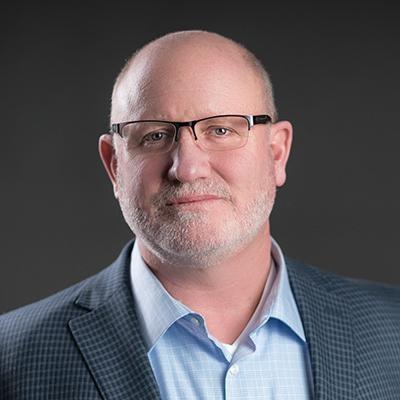
Jeffery Lang is currently the President and Chief Executive Officer of the Workplace Safety and Insurance Board. Previously, he was the President and CEO of two Ontario-based manufacturing businesses with customers around the world. Jeffery completed his undergraduate degree in Social Sciences and honours degree in Political Science at the University of Western Ontario, King's University College. He is co-founder and Board Chair of the Canadian Economic Development Assistance for South Sudan and has held many past community roles, including Vice President of Ronald McDonald House Charities, President of Boys & Girls Club of London, Board Chair, Alzheimer Foundation of London, and Board Members of Pathways Skills Development and the London Food Bank.
Plenary Session: Mental Health Matters, an Update from the Workplace Safety and Insurance Board
Scott MaxwellExecutive Director
Wounded Warriors Canada
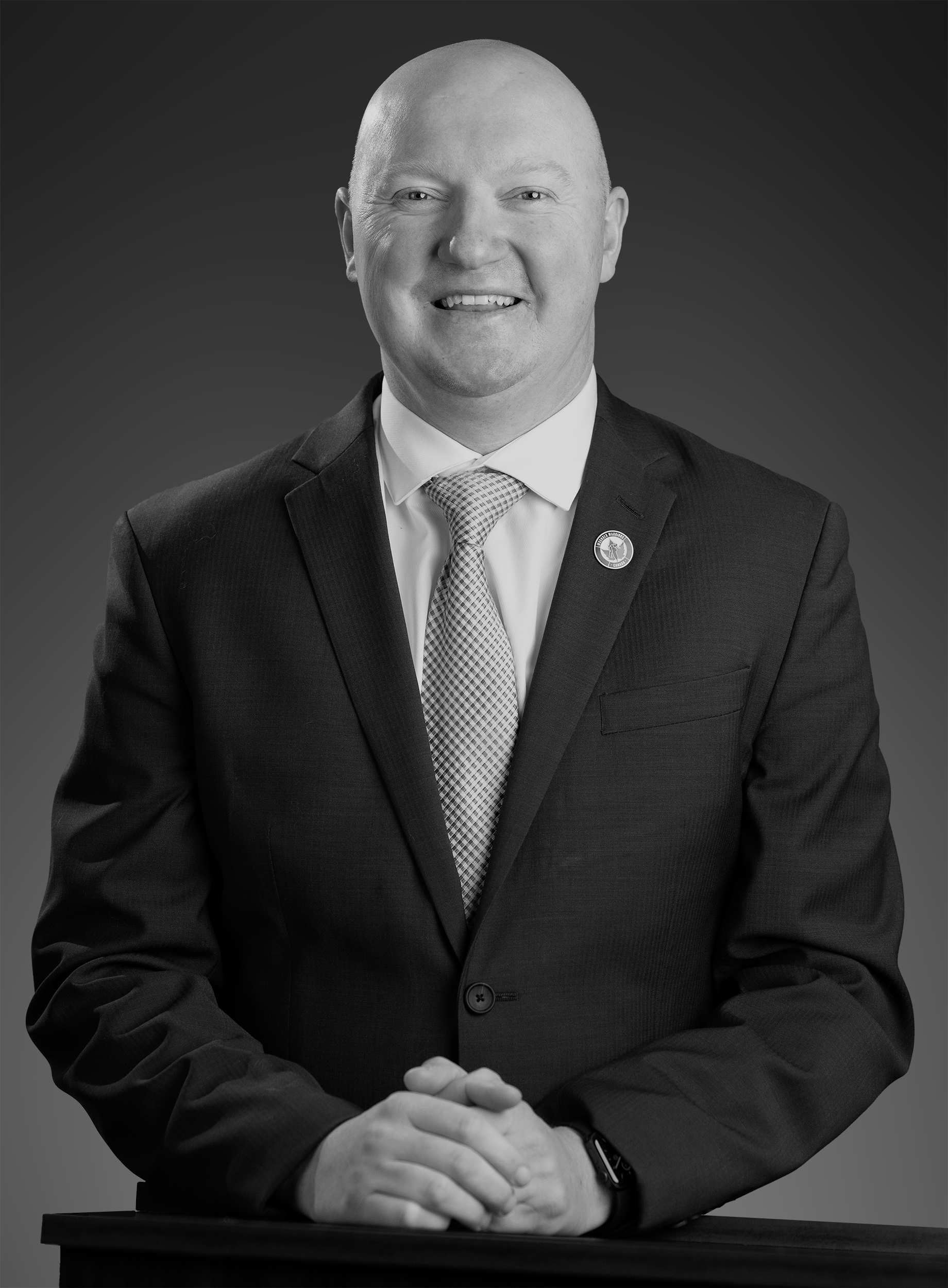
On June 11, 2007 Trooper Darryl Caswell, a high school friend of Scott's, was killed by a roadside bomb in Afghanistan. From that day forward, Scott made a promise to himself that he would find a way to give back to those who bravely serve Canada.
In 2013, Scott accepted the position of Executive Director of Wounded Warriors Canada. He embarked on a journey in the mental health sector that has seen him successfully transform what was a volunteer-based, local charitable fund into a national mental health service provider that supports over 2,000 Veterans, First Responders and their families each year.
Plenary Session: Setting the Stage and Closing Remarks
Dr. Dante Morra MD, MBA, FRCP(C) | President of Trillium Health Partner Solutions and Chief of Clinical Innovation, Professor of Medicine-University of Toronto, Adjunct Professor-Rotman School of Management | Trillium Health Partners
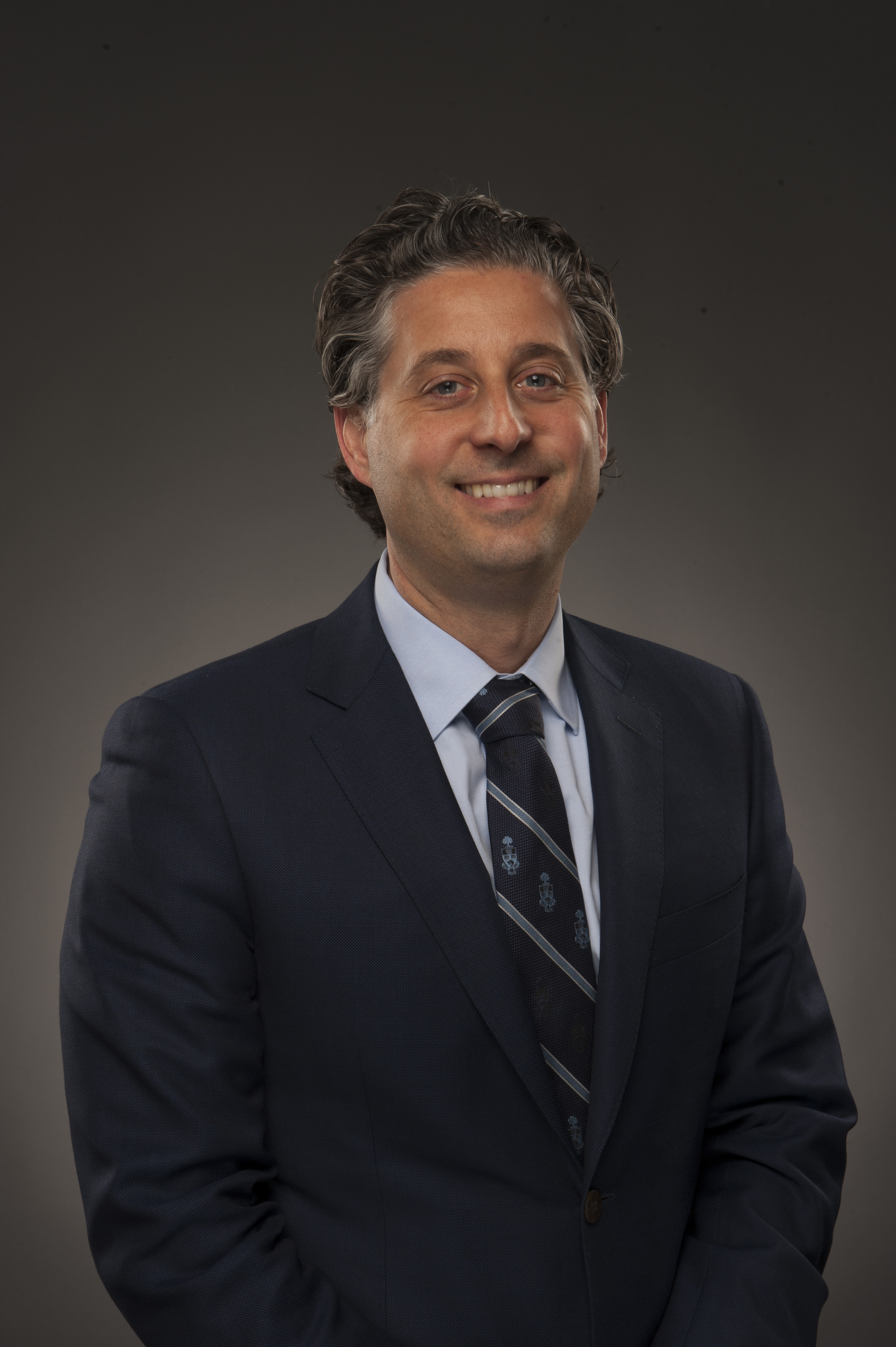
Dr. Dante Morra has made it his life's work to advance Canadian health care by creating a new, more inclusive and prosperous health care economy. From the start of his career as a physician, researcher and teacher at the University of Toronto, he has stood out as an original thinker who could see all too clearly how the Canadian health system is slow to embrace innovation and commercial partnerships. Dr. Morra is now recognized as one of the most successful innovators of health care in Canada, spearheading the much-needed movement to harness Canadian research and development talent to unlock economic prosperity. For his efforts he was recently recognized in The Globe and Mail's April Report on Business Magazine in the Top 50 Executives 2022 as a key academic leader who translates ideas into real world change.
Dr. Morra is a full Professor at the Temerty Faculty of Medicine at the University of Toronto, and an Adjunct Professor at Rotman. He is a highly sought-after prize-winning teacher whose course on leadership systems change and quality has revolutionized how doctors are trained.
In his hospital role, Dr. Morra has also launched a series of bold ventures to transform health care. They include the Institute for Better Health, founded in 2014 to lead practical research to solve the major challenges in the health care system, and the CAN (Coordinated Accessible National) Health Network, founded in 2019, that allows Canadian medtech companies to scale to their full potential to advance prosperity through a new health care economy.
Plenary Session: Opening Remarks
Matthew PeggExecutive Chief Fire Officer, Fire Chief
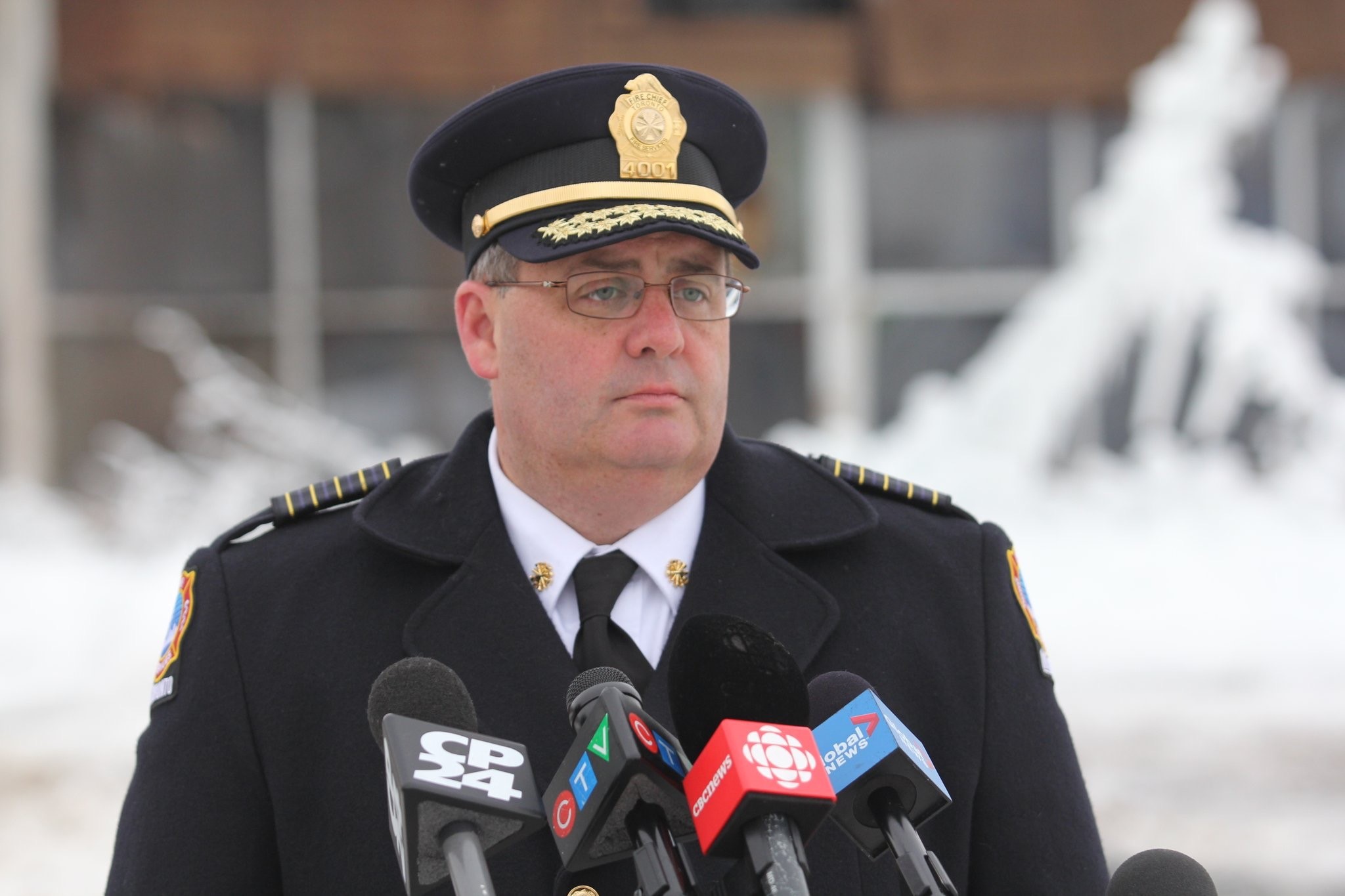
Matthew Pegg is the Fire Chief in the City of Toronto, Ontario, Canada. Toronto Fire Services is the largest fire service in Canada and one of the largest in North America, with more than 3,200 career staff. From March 2020 through April 2022, Chief Pegg led the City of Toronto's response to COVID-19 and served as the COVID-19 Incident Commander throughout the global pandemic, leading the development and continued operation of one of the most complex incident management systems in North American history. This included leading the longest-ever continuous deployment of Toronto's Emergency Operations Centre, as well as the development and operation of Toronto's COVID-19 Immunization Task Force.
Prior to being appointed as Fire Chief in Toronto, Chief Pegg served as a Deputy Fire Chief in Toronto, Brampton, Ajax and Georgi, and he is also a licensed mechanic and a commercial pilot, having also worked in both industries.
Chief Pegg is a graduate of Dalhousie University in both Leadership and Administration, Queen's University in Labour Relations and the Schulich School of Business' in Public Management. He is a recipient of the Heroism and Community Service Medal, Ontario Medal of Firefighter's Bravery, the Canadian Fire Service Exemplary Service Medal and the Ontario Fire Services Long Service medal. Chief Pegg has been awarded the Executive Chief Fire Officer Professional Designation and also serves as Honourary Aide de Camp to Her Honour, Elizabeth Dowdeswell, the Lieutenant Governor of Ontario.
Chief Pegg volunteers his time and expertise as a Board Member with both the Canadian Journal of Emergency Management and Lay-Up Youth Basketball, and is proud to serve as an ambassador for Wounded Warriors Canada. Chief Pegg previously served 13 years on the Board of the Ontario Association of Fire Chiefs, serving the last three years of his tenure as President, where he developed the implemented the “One Message - One Voice” government relations strategy. Chief Pegg is a co-author of the Leadership Forum in Fire Fighting in Canada Magazine and is a highly sought after International speaker, trainer and leadership expert who frequently works with both public and private sector executives on developing and implementing transformational leadership and management strategies.
Plenary Panel Session: Supporting the Mental Health of our First Responders, Leadership to the Frontlines
The purpose of this panel discussion is to explore some of the particular concerns relating to leadership and frontline workers across First Responder Organizations. The panel we discuss potential strategies for addressing mental health concerns in both populations as well as mitigating risks.
Keynote Address: Resilience Under Fire Adapted from Good Sleep Requires Shiny Shoes
Andrea SharpBSW, MSW, RSW, Clinical Manager, First Responder Mental Health Pilot Specialty Program
Insight Health Solutions, Trillium Health Partners
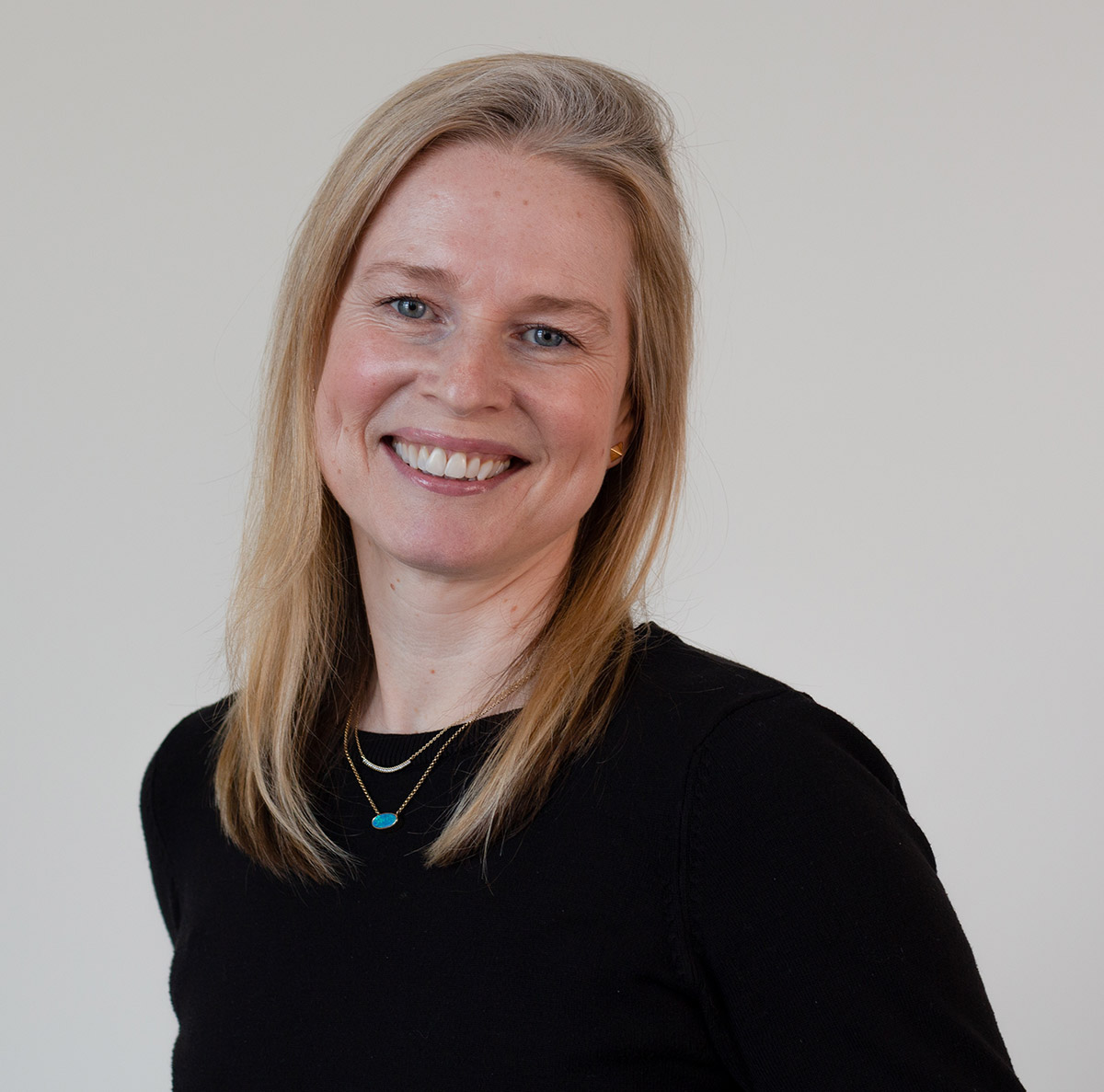
Andrea Sharp oversees the First Responder Mental Health Pilot Specialty Program. She is passionate about mental health care, and has over 20+ years of clinical, professional practice, and leadership experience within acute care and ambulatory care settings. Andrea is a registered social worker and is certified in Mindfulness Based Cognitive Therapy. She holds a Bachelor of Social Work from Toronto Metropolitan University, and a Master of Social Work from the Factor-Inwentash Faculty of Social Work, University of Toronto.
Plenary Session: A look at the WSIB's First Responder Mental Health Speciality Pilot Program and the Employee Engagement Sessions that Shaped Today's Conference
The Workplace Safety and Insurance Board's (WSIB) First Responder Mental Health Pilot Specialty Program is an interprofessional program based on a stepped model of care, designed to provide effective and evidence-based care to Ontario's First Responders. The program is offered through Trillium Health Partners' (THP) Insight Health Solutions (IHS) as well as their partners: Ontario Shores Centre for Mental Health Services, EHN Gateway Recovery Centre, Woodstock General Hospital, and Wounded Warriors Canada. The goals of the program are to address the mental health impairments that impact return to work and function. A program review including outcomes and lessons learned will be presented as well as a summary of Insight Health Solutions recent engagement sessions with First Responder leaders.
Mary Ann BayntonMSW, Director of Collaboration and Strategy
Workplace Strategies for Mental Health
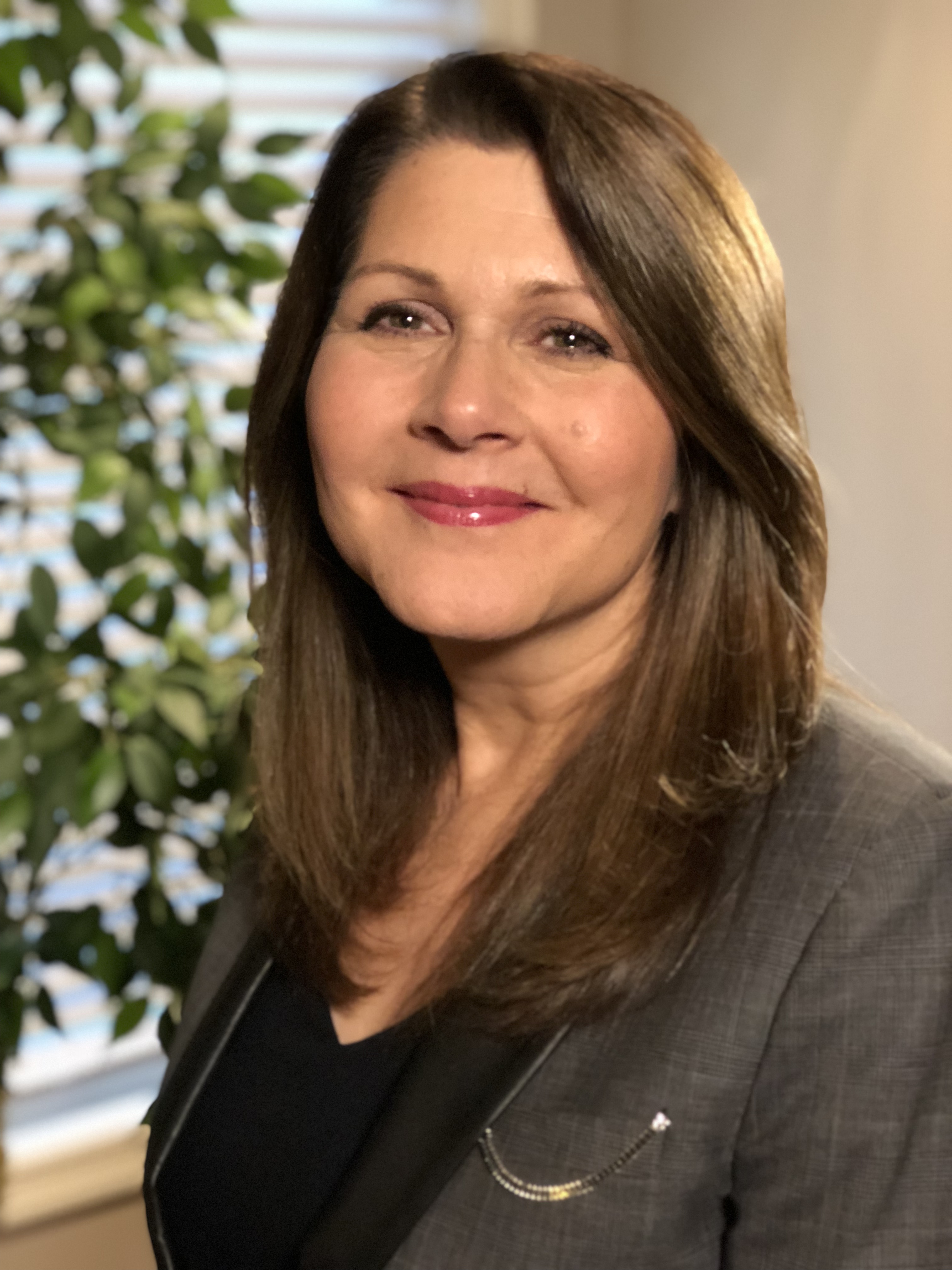
Mary Ann is the CEO of Mary Ann Baynton & Associates Corp. where she consults with all levels of government and a diverse range of organizations that include unions, associations, and institutions across the country.
Her areas of expertise include workplace mental health, psychological safety, resolving conflict, and addressing performance concerns. She is the author of several books including The Evolution of Workplace Mental Health in Canada: Towards a Standard on Psychological Health and Safety.
She has contributed to many committees including with the Workforce Advisory Committee for the Mental Health Commission of Canada, Accessibility for Ontarians with Disabilities Act, and was co-chair of the technical committee for the development of the National Standard of Canada on Psychological Health and Safety in the Workplace.
Mary Ann is an advisor to both Mindful Employer Canada and My Workplace Health and serves as the Director of Strategy and Collaboration for Workplace Strategies for Mental Health which produces free resources for all Canadians compliments of Canada Life.
Workshop Session: Supporting a Plan for Resilience
Building and maintaining resilience is a lifelong endeavour that can be impacted at any time by life experiences. Whether for yourself or your team, there is an approach that was originally developed to improve self-awareness but when studied by Queen's University researchers, had an immediate and statistically significant impact on reducing depressive symptoms and increasing coping ability. This approach has been used extensively with police and other first responders and will be available to you as a takeaway from this session.
Dr. Tim Black, R. Psychologist, Wounded Warriors Canada

Dr. Tim Black, R. Psychologist is a clinician and researcher who specializes in Post-Traumatic Stress Disorder, Military to Civilian Transition and group counselling approaches. He has been working with Trauma Exposed Professionals (TExP) such as Canadian Armed Forces members, Veterans, First Responders, and their families for 20 years. Dr. Black has co-developed national programs for Veterans in transition, is the co-founder and lead researcher of the Wounded Warriors Canada COPE (Couples Overcoming PTSD Every Day) program, Trauma Resiliency Program (TRP), Trauma Resiliency Training (TRT), and he developed the WWC Introduction to Trauma Exposed Professionals (TExP) online course. Tim, working with a dedicated team of mental health professionals, has trained psychologists and counselling clinicians across Canada to work with those most affected by trauma exposure in their work.
Workshop Session: Supporting First Responders and other Trauma Exposed Professionals (TExP): The Role of Cultural Competence
This session will provide an overview of Wounded Warriors Canada's innovative new online course, Introduction to Trauma Exposed Professionals, clinically developed by Dr. Tim Black. Participants will gain insight into Dr. Black's 20-year career supporting trauma exposed professionals (TExPs) and the culturally-specific clinical approaches that are supporting the complex mental health needs of those who serve Canada at home and abroad.
Shawn Carter, M.ADS., BCBA, Executive Director
Gateway Recovery Centre, EHN Canada

Shawn is a Board-Certified Behaviour Analyst (BCBA) with 15 years of experience working in children, adolescent, and adult mental health. He is the current Executive Director of EHN Canada's Gateway Recovery Centre - Canada's first facility dedicated exclusively to the treatment of trauma and addiction among military, first responders, and frontline healthcare workers. His leadership experiences include Clinical Manager of various psychotherapy clinics and patient access and flow programs at Ontario Shores Centre for Mental Health Sciences. Shawn was instrumental in the development of an outpatient psychotherapy clinic dedicated to the mental health needs of First Responders in Ontario, in collaboration with Wounded Warriors Canada. He is passionate about the delivery of quality mental health care and is honoured to be supporting active military service members, veterans, first responders, and healthcare workers, who do so much in the service of others.
Workshop Session: The Journey Through Mental Health and Addiction Treatment for First Responders in Ontario - The Role of Inpatient Treatment in the Continuum of Care
It is widely known that Public Safety Personnel (PSP) are frequently exposed to traumatic events throughout their careers. The impact of this exposure can often have lasting consequences on PSP's mental health and functional ability on and off shift. These consequences may include the development of Post-Traumatic Stress Disorder, Depression, Anxiety, Substance Use Disorders and other debilitating mental health conditions, thus requiring intensive treatment. This session will explore the role of inpatient treatment in the treatment of these conditions in the context of the continuum of care available to PSP in Canada. The psychological, psychosocial and medical components of inpatient treatment will be discussed with an emphasis on receiving the right treatment at the right time.
Dr. Yelena Chorny, MD, MSc, CCFP(AM)
Chief of Addiction & Trauma Services, Homewood Health Centre

Dr. Yelena Chorny is a leader in the delivery of compassionate, evidence-based care to people with substance use and concurrent disorders. In her current role as Chief of Addiction & Trauma Services at Homewood Health Centre, she is known for her skills in strategic thinking, communication, and collaboration. Dr. Chorny's leadership has been instrumental in the development and delivery of innovative services including Homewood Health Centre's Traumatic Stress Injury & Concurrent Program, Guelph's Rapid Access Addiction Medicine Clinic, and the Cat Lake First Nation Wellness Program. She certified in both Family Medicine and Addiction Medicine by the College of Family Physicians of Canada. Dr. Chorny lives in Guelph, Ontario with her partner, son, and a 100-pound lap dog.
Workshop Session: Redesigning Concurrent Inpatient Treatment Programs Based on Measurement-based Care, Client Feedback, Clinical Experience, and Research.
Treating concurrent disorders in a First Responder population: How an inpatient program used measurement based care, client feedback, clinical experience and research to re-design treatment programs for concurrent disorders - lessons learned and evaluation findings.
Dr. Megan EdgelowBScOT, MSc, EdD, OT Reg. (Ont.), Assistant Professor
Queen's University
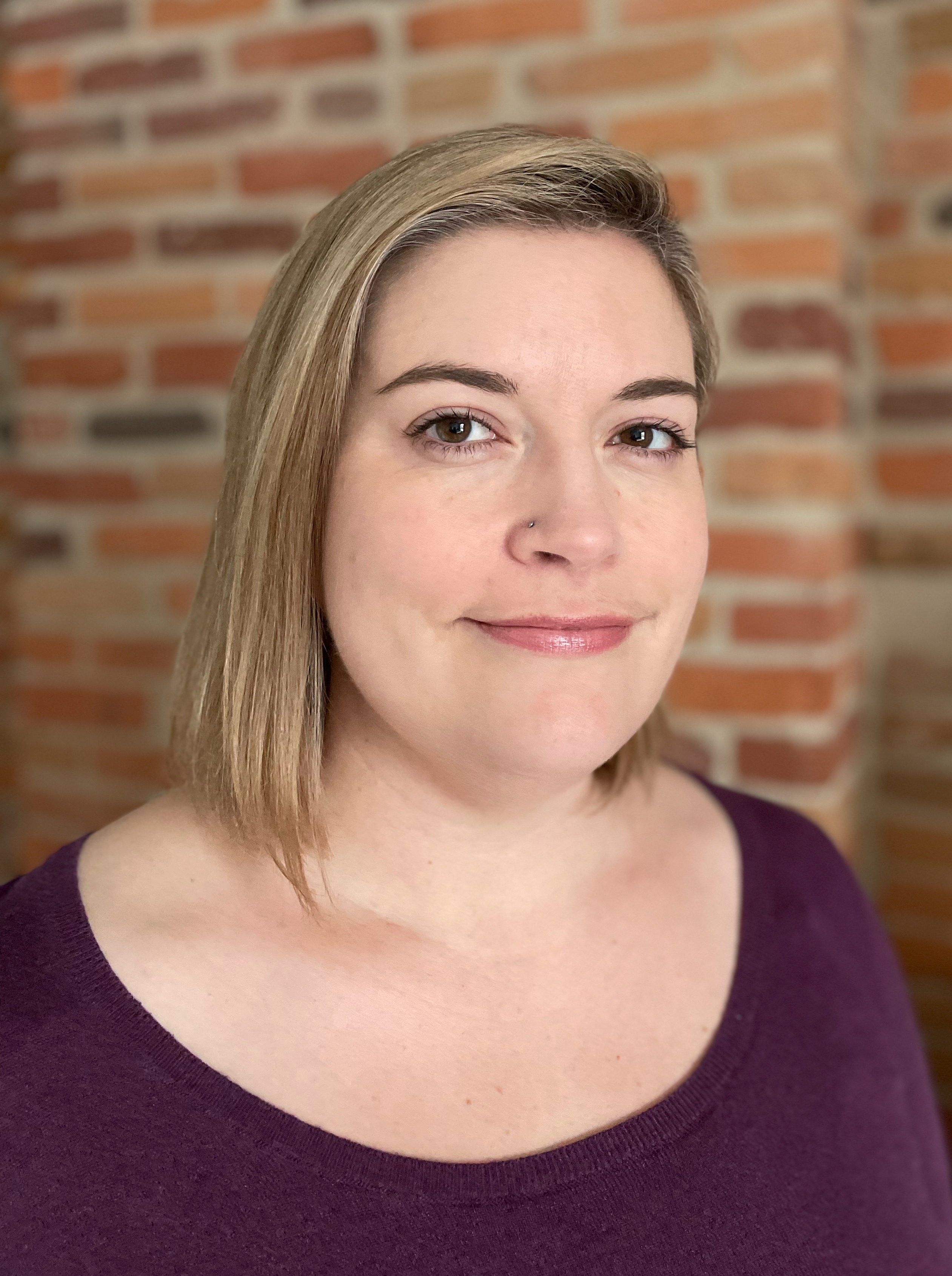
Dr. Megan Edgelow is an Assistant Professor in the School of Rehabilitation Therapy at Queen's University. She has clinical, teaching, and research experience in the areas of mental health, work, and activity participation. Her current program of research focuses on work's impact on the mental health of public safety personnel. She also has a clinical occupational therapy practice serving workers with mental health conditions, including operational stress injuries.
Workshop Session: Bridging the Return to Work Gap for Public Safety Personnel: Bringing Organizational Factors Into Focus
Worker's compensation mental health claims continue to rise for public safety personnel across the country, including paramedics, firefighters, police officers, and correctional officers. It is now well acknowledged that public safety personnel have a higher prevalence of mental health conditions, including depression and anxiety disorders and posttraumatic stress disorder (PTSD), than the general population. Research to date has focused on person-level interventions, including psychotherapy, resilience training, and peer support, while research related to organization-level interventions is still developing, along with the evidence for best practices in return to work for this population. This presentation will present a new model for considering the contribution of operational, personal and organizational factors to public safety personnel mental health, as well as which factors are most amenable to change. Further, the return to work experiences of public safety personnel in Ontario since presumptive PTSD legislation will be explored, and inform a discussion of the return to work evidence to date. This presentation will bridge the gap between the organization and employees as they engage with the return to work process and provide practical considerations for addressing both sides of this continuum.
Col (ret'd) Rakesh JetlyOMM, CD, MD, FRCP, Psychiatrist and Scientist
Institute for Mental Health Research and Royal Ottawa Hospital
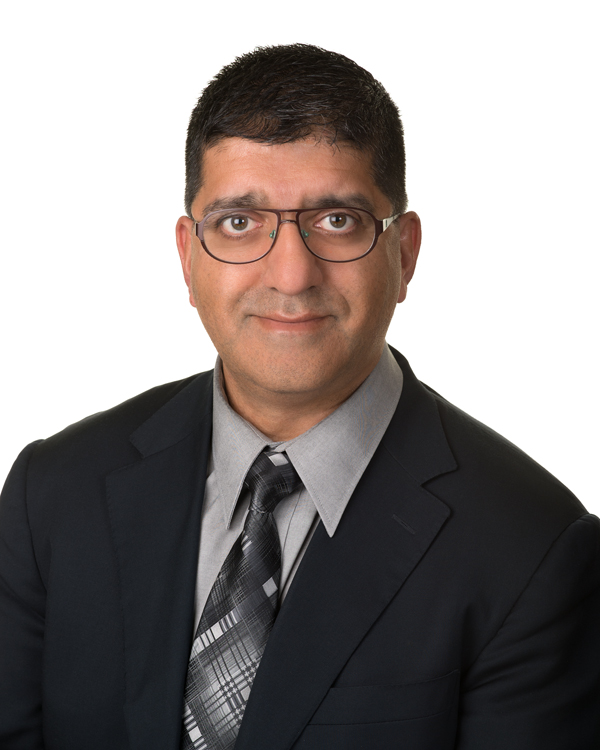
Col (ret'd) Rakesh Jetly is an internationally recognized thought leader in the areas of military and veterans mental health, suicide prevention and posttraumatic stress disorder. In 2021 he retired as the Chief of Psychiatry for the Canadian Armed Forces. His leadership extended beyond Canada as Colonel Jetly took an increasing leadership role within NATO chairing expert panels in areas such as “morality of mental health”, “leveraging technology in mental health” and “precision medicine”. His research agenda has included dozens of studies ranging from understanding the biological underpinnings of mental illness to precision/personalized medicine. Dr. Jetly has published over 80 peer-reviewed articles and book chapters. Dr. Jetly currently holds various advisory positions and in addition is the Chief medical Officer of Mydecine Innovation Group overseeing development and clinical trials involving psychedelics.
Since leaving the Canadian Armed Forces Dr. Jetly has continued his contribution to health and wellbeing. He is the founder and Chair of Empatho Corp an AI driven wellbeing platform. He is also the Chief Medical Officer of Mydecine innovation Group a biopharma company developing treatments for mental health and addictions.
Workshop Session: Moral Injury: The Past, Present and Possibly the Future
Moral Injury is a concept that has garnered interest for several decades within military veterans and active-duty personnel often in the context of posttraumatic stress disorder. It was felt that the traditional definition of posttraumatic stress disorder PTSD did not fully account for feelings of persistent guilt, shame and anger experienced by these individuals. This session will briefly review the history of moral injury from its origins within the US VA system. Various definitions of moral injury will be presented for discussion. The ongoing debate PTSD vs. MI will be discussed as some have argued that moral injury and PTSD are distinct disorders, others feel moral injury is a subtype of PTSD, further some believe moral injury "complicates" PTSD and a final group feels that PTSD should be replaced by moral injury. Several case examples will be discussed with video clips also to interactively explore moral injury vs. PTSD. Currently moral injury is discussed in various additional populations including first responders and front-line health care workers. "Burnout" is often attributed to moral injury and often manifests as anger after a sense of betrayal. The state-of-the-art with regards to assessment and treatment of moral injury will be explored as some have questioned the efficacy of treatment based on the fear-based paradigm of PTSD.
Dr. Krystle MartinC. Psych, Clinical Psychologist
Gateway Recovery Centre, EHN Canada

Dr. Krystle Martin has 15 years mental health experience, 10 of them as a Psychologist treating clients with trauma and addiction. Previously, she has worked at Ontario Shores Centre for Mental Health Sciences as a Psychologist and Researcher, at Durham Regional Police as a Psychologist/Consultant, and in general hospitals, correctional facilities and CAMH. She had a private practice specializing in treating First Responders, Military, Veterans, Workplace Trauma and BPD. Krystle belongs to various communities of practice, including Treatment of PTSD in First Responders in Ontario and Moral Injury in Ontario. She also works in collaboration with The Atlas Institute for Veterans and families.
Workshop Session: The Journey Through Mental Health and Addiction Treatment for First Responders in Ontario - The Role of Inpatient Treatment in the Continuum of Care
It is widely known that Public Safety Personnel (PSP) are frequently exposed to traumatic events throughout their careers. The impact of this exposure can often have lasting consequences on PSP's mental health and functional ability on and off shift. These consequences may include the development of Post-Traumatic Stress Disorder, Depression, Anxiety, Substance Use Disorders and other debilitating mental health conditions, thus requiring intensive treatment. This session will explore the role of inpatient treatment in the treatment of these conditions in the context of the continuum of care available to PSP in Canada. The psychological, psychosocial and medical components of inpatient treatment will be discussed with an emphasis on receiving the right treatment at the right time.
Dr. Beth MilliardPhD, Staff Sergeant, Post-Doctorate Fellow
York Regional Police and Canadian Institute of Public Safety Research & Treatment
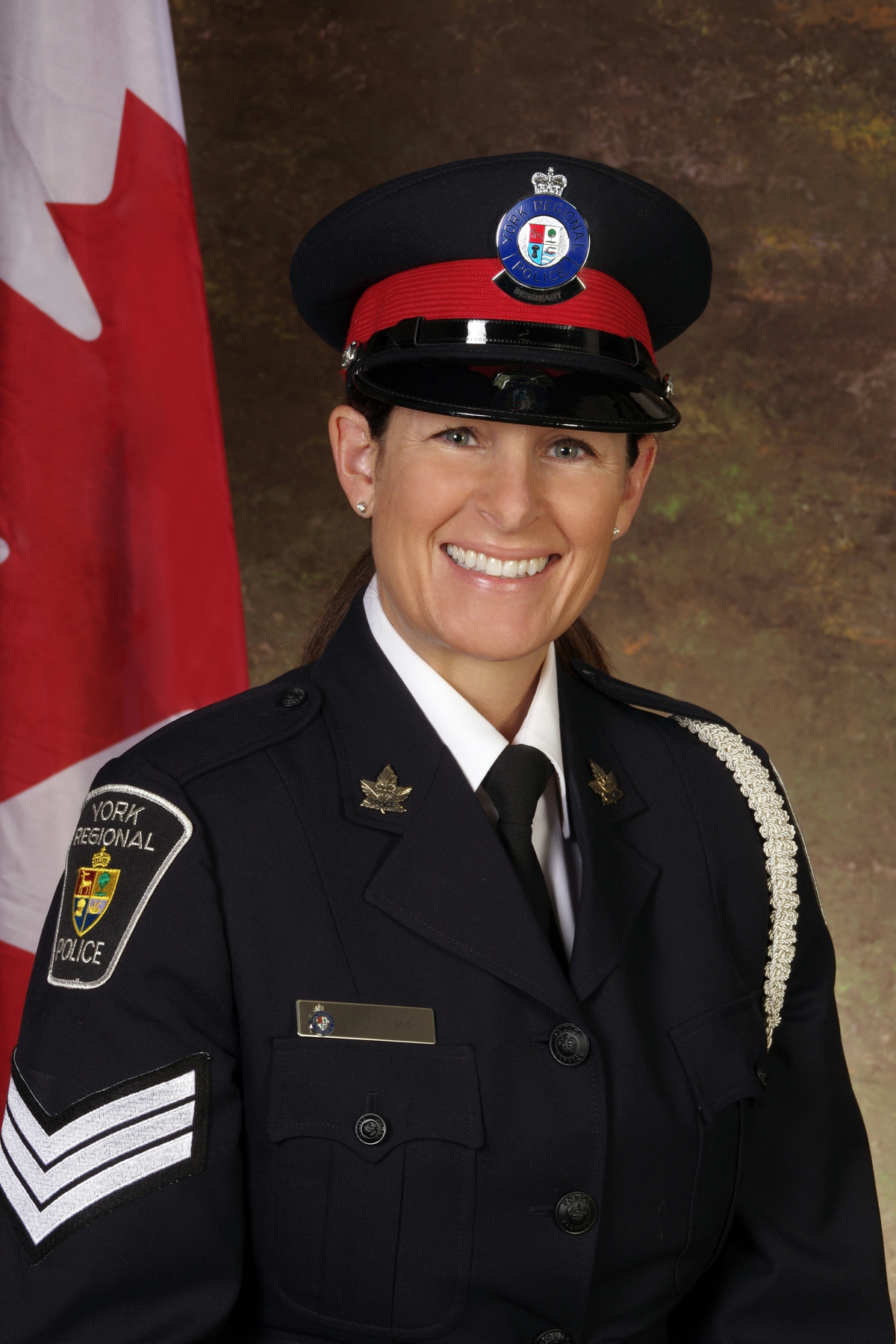
Dr. Beth Milliard is a police officer with York Regional Police in Ontario, Canada. She is in her 21st year and is currently a Uniform Staff Sergeant overseeing a platoon. She is also a post-doctoral fellow with the University of Regina in the Canadian Institute for Public Safety Research and Treatment (CIPSRT) and an adjunct professor with Georgian College. Currently she is the Chair of the Mental Health Secretariat Evaluation Advisory Committee (EAT) and the Co-chair of the National Peer Support Community Network (PSCN). As a subject matter expert in Project Safeguard and Peer Support, she has had the opportunity to speak at venues internationally and has been asked to participate in various Podcasts on her work as a leader in police wellness. She has been the author and peer reviewer of many articles and book chapters related to first responder mental health and wellness. She has completed her Master's in Leadership and has her PhD in Criminal Justice/Law and Public Policy with an emphasis in mental health.
Workshop Session: Impact of Peer Support for Public Safety Personnel and Emerging Issues
Peer support has been identified as the most common mental health resource that is available to and sought by Canadian public safety personnel (PSP). It has been recognized that peer support plays a huge role in assisting PSP with organizational, operational, and personal stressors and has increased mental health literacy. However, studying the long-term effects of peer support are difficult as there is no official standard on the selection, delivery, training, and maintenance of peer support programs for PSP. The National Peer Support Community Network (PSCN) was created by CIPSRT and Atlas in June 2022 to bring together subject matter experts to collaborate on best practices for peer support for PSP, Veterans' and family members. This presentation will present research findings on the utilization and impact of peer support in a specific police organization and, include the work currently being done by the PSCN.
Dr. Candice MonsonPhD, Professor and CEO
Toronto Metropolitan University and Nellie Health

Dr. Candice M. Monson, PhD, is Professor of Psychology at Toronto Metropolitan University and Founder and CEO of Nellie Health. Dr. Monson has been externally funded and has published extensively on the development, testing, and dissemination of PTSD treatments and interpersonal factors in trauma recovery. Among her honors, she is a Fellow of the American and Canadian Psychological Associations and Association of Behavioral and Cognitive Therapies, was the Canadian Psychological Association Trauma Psychologist of the Year in 2013, and was inducted into the Royal Society of Canada in 2016. She has co-authored 7 books, including Cognitive Processing Therapy: A Comprehensive Manual and Cognitive-Behavioral Conjoint Therapy for PTSD, and has published over 200 scholarly publications. Dr. Monson is well-known for her efforts in training clinicians in evidence-based assessments and interventions for PTSD.
Workshop Session: Maximizing Posttraumatic Recovery by Incorporating Close Significant Others in Assessment and Treatment
In this session, Dr. Monson will review information on the association between interpersonal factors and traumatic stress-related problems and the role of close others in optimizing assessment and treatment.
Shannon RemersMSc (OAMHP), Senior Manager of Research and Outcomes
Homewood Health Centre

Shannon has worked in the mental health and addictions sector for more than a decade. She received her Masters of Science in Cognitive Neuroscience from Wilfrid Laurier University and a Bachelor of Science in Biology and Psychology, as well as a diploma in Forensics Science, from Saint Mary's University.
Currently, she is the Senior Manager of Research and Outcomes at Homewood Health Inc (HHI). In this role, she leads HHI's internal research initiatives aimed at optimizing outcomes, bringing best practice into programs, implementing measurement-based care in treatment, and using psychometrics to help determine optimal treatment plans.
Workshop Session: Redesigning Concurrent Inpatient Treatment Programs Based on Measurement-based Care, Client Feedback, Clinical Experience, and Research.
Treating concurrent disorders in a First Responder population: How an inpatient program used measurement based care, client feedback, clinical experience and research to re-design treatment programs for concurrent disorders - lessons learned and evaluation findings.
Dr. Dwayne Van EerdPhD, Scientist
Institute for Work & Health
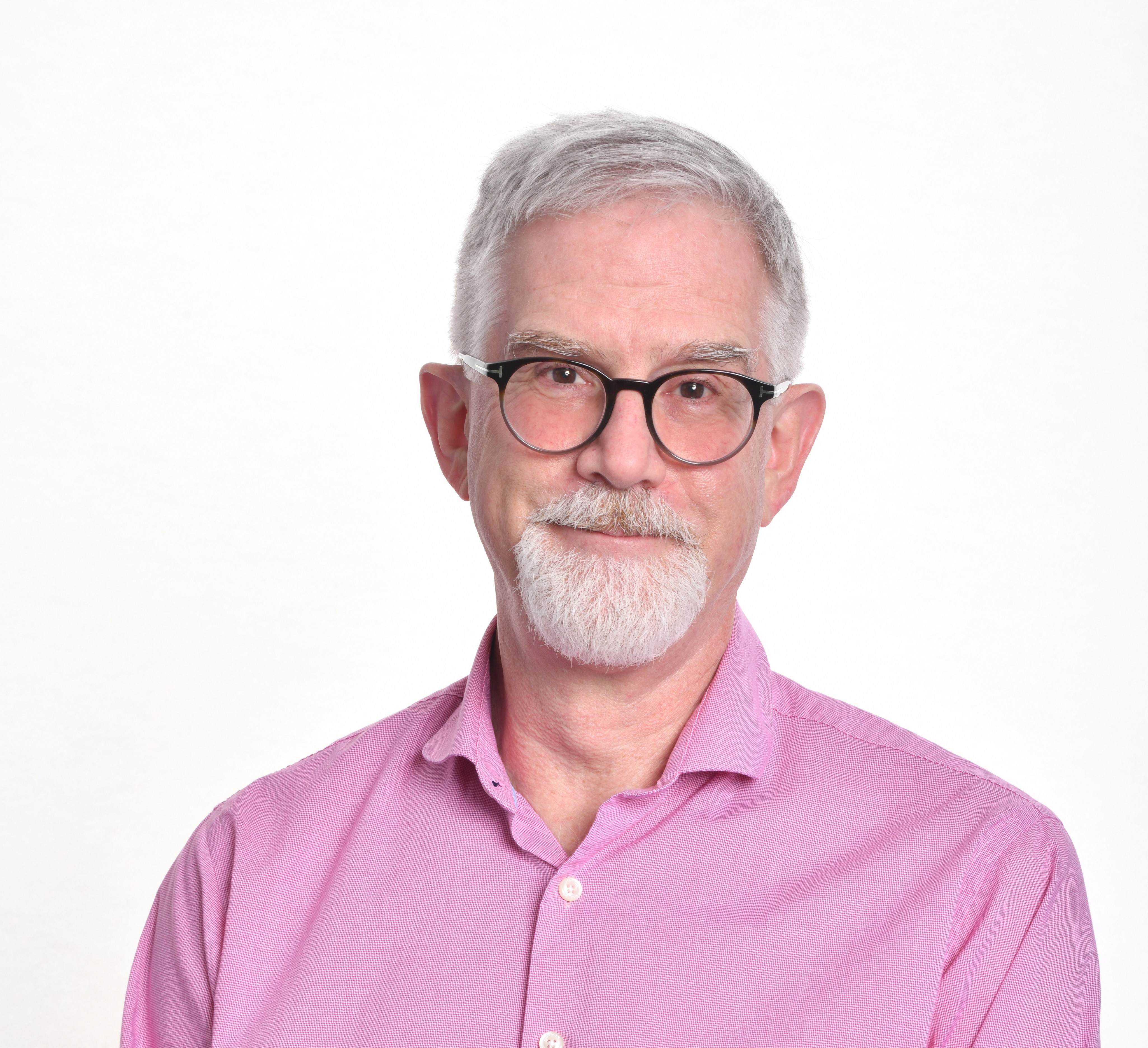
Dr. Dwayne Van Eerd is a scientist at the Institute for Work & Health, where he has been a researcher since 1997. He has an MSc and BSc in kinesiology from the University of Waterloo, an MSc in health research methodology from McMaster University, and a PhD in work and health from the Faculty of Applied Health Sciences at the University of Waterloo.
Upon getting his MSc in kinesiology, Van Eerd got his start in occupational health and safety research in a clinical setting, studying musculoskeletal disorders (MSDs) of the upper body. Now a scientist with the Institute for Work & Health, he focuses primarily on the prevention of MSDs, as well as on the implementation of programs and practices to prevent work injury and disability related to physical and mental health.
His research projects include evaluations of participatory ergonomics interventions, evaluations of workplace MSD and mental health practices/programs and their implementation, and systematic reviews of the prevention literature. Van Eerd also practices and researches integrated knowledge transfer and exchange.
Workshop Session: Return to Work in Ontario Police Services
This session will describe the findings of a recently completed research project examining the return to work (RTW) process in Ontario police services. The research team, worked together with an advisory committee with members from the Police Association of Ontario (PAO), the Ontario Association of Chiefs of Police (OACP), and the Ontario Provincial Police Association (OPPA), the Ontario Police Health and Safety Association (OPHSA). The data were gathered via interviews with members (sworn and civilian) who returned to work following an injury as well as those who provide RTW supports at 10 services (various sizes) across Ontario. The data show key aspects of the RTW process within five themes: Context, Culture, Accommodation, Communication and Trust-building. Suggested policy and practice improvements include: accommodation flexibility; increased clarity of RTW process and expectations; genuine and timely communication; protection of confidentiality; and eliminating the use of stigmatizing language.
Dr. Mark Weiss, MD, MCFP, Medical Director Bellwood Health Services
Gateway Recovery Centre, EHN Canada
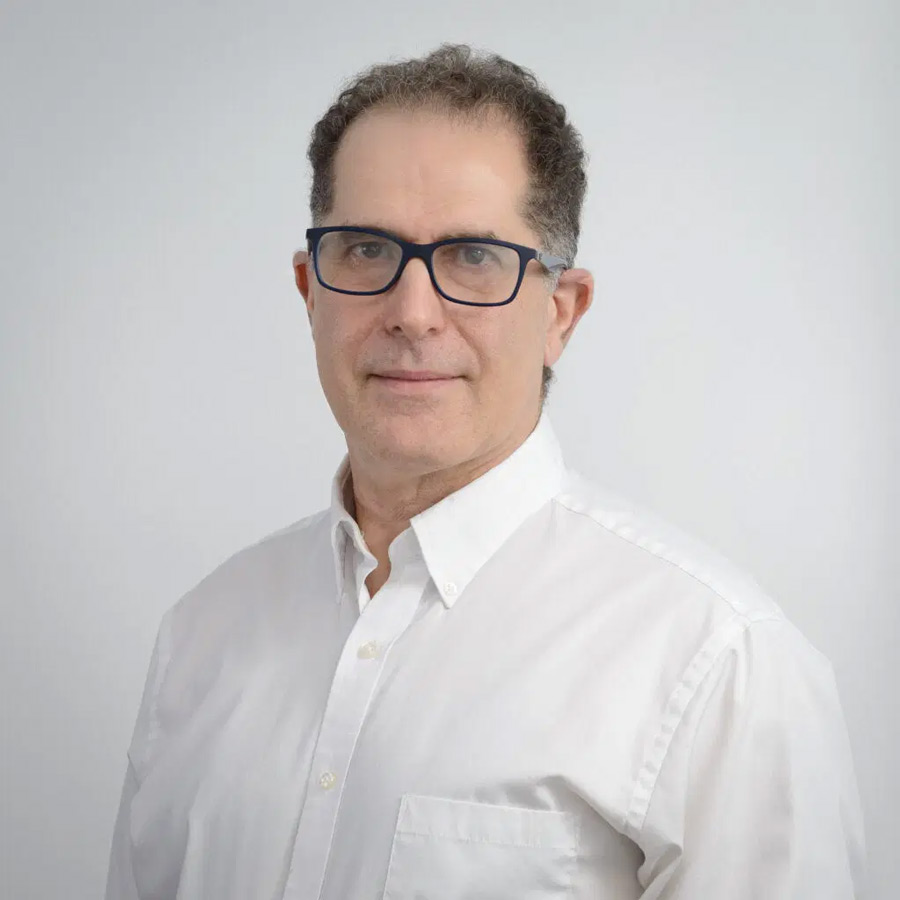
Dr. Mark Weiss, M.D., MCFP (AM), returns to EHN Canada in the role of Medical Director. Mark provides clinical and leadership services across EHN Canada, and oversees medical care Bellwood Health Services in Toronto, Ontario and Gateway Recovery Centre in Peterborough, Ontario. Mark comes to EHN Canada with over 20 years of specialization in Addiction Medicine, including impressive leadership experience within specialized inpatient addiction treatment settings, with prior roles including Chief of Addiction Medicine at Homewood Health Centre, and Medical Director at Bellwood Health Services from 2016-2019.
Workshop Session: The Journey Through Mental Health and Addiction Treatment for First Responders in Ontario - The Role of Inpatient Treatment in the Continuum of Care
It is widely known that Public Safety Personnel (PSP) are frequently exposed to traumatic events throughout their careers. The impact of this exposure can often have lasting consequences on PSP's mental health and functional ability on and off shift. These consequences may include the development of Post-Traumatic Stress Disorder, Depression, Anxiety, Substance Use Disorders and other debilitating mental health conditions, thus requiring intensive treatment. This session will explore the role of inpatient treatment in the treatment of these conditions in the context of the continuum of care available to PSP in Canada. The psychological, psychosocial and medical components of inpatient treatment will be discussed with an emphasis on receiving the right treatment at the right time.
LCol (Ret'd) Dr. Alexandra HeberMD FRCPC CCPE, Executive Director (CIPHER) and Chief Psychiatrist VAC (on secondment)
Canadian Institute for Pandemic Health Education and Response (CIPHER) and Veterans Affairs Canada
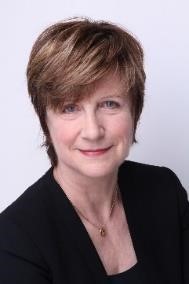
Dr. Alexandra Heber has over 35 years' experience working in mental health, first as a nurse, then as a psychiatrist. After a decade working with HIV+ clients and leading an Assertive Community Treatment Team in Toronto, she enrolled in the Canadian Armed Forces in 2006, and deployed to Afghanistan in 2009. In 2016, she became inaugural Chief of Psychiatry for Veterans Affairs Canada. In 2019, she was a member of the Ontario Chief Coroner's Expert Panel on Police Officer Deaths by Suicide.
Dr. Heber worked closely with the Public Health Agency of Canada to develop the 2019 Federal Framework on PTSD. In March 2020, she led a Task Force for the Canadian Institute for Public Safety Research and Treatment, to create online resilience supports for first-responders and public safety personnel during the COVID-19 pandemic; “The COVID-19 Readiness Resource Project”. In 2022, Dr. Heber appeared before the Mass Casualty Commission investigating the April 2020 shooting events in Portapique, Nova Scotia, as an Expert Witness on The Needs of First Responders After a Mass Casualty Incident. Currently, she is leading creation of a Knowledge Hub, the Canadian Institute for Pandemic Health Education and Response (CIPHER), a federally-funded project to curate and mobilize mental health resources for frontline workers affected by COVID-19.
Dr. Heber has written two online courses on PTSD treatment, and has presented and published nationally and internationally on trauma and mental health in military, veteran, and first-responder populations. She co-chairs the Canadian Military Sexual Trauma Community of Practice, and she is Lead Author on the Glossary of Terms 3.0.
Dr. Heber is an Associate Professor in the Department of Psychiatry and Behavioral Neurosciences at McMaster University.
Workshop Session: Distress and Recovery During COVID-19: Working with First-Responder Experiences (an Interactive Workshop)
Working during the COVID-19 pandemic has deeply affected the mental health, well-being and lives of many first responders, including those working in Public Safety and in Healthcare. These workers have often continued to serve their fellow citizens, at great personal expense, throughout the pandemic. During this workshop, participants will explore, with the facilitators, some of these effects on first responders, and discuss the causes, including systemic issues that laid the groundwork for these outcomes. The group will then explore potential ways to alleviate and recover from these negative effects, which have so often profoundly affected first responders, their families and caregivers over the past 3 years.
Dr. Margaret McKinnon, PhD, Clinical Psychologist, Homewood Chair Mental Health and Trauma, Professor and Associate Chair Research Department of Psychiatry/Behavioural Neurosciences
McMaster University

Dr. Margaret McKinnon is Full Professor and Associate Chair, Research in Department of Psychiatry and Behavioural Neurosciences at McMaster University, where she holds the Homewood Chair in Mental Health and Trauma. She is also the Research Lead for Mental Health and Addictions at St. Joseph's Healthcare Hamilton and a Senior Scientist at Homewood Research Institute. Work in Dr. McKinnon's laboratory focuses on identifying the neural and behavioural correlates of PTSD and trauma-related illnesses and on translating this knowledge to the development and testing of novel treatment interventions aimed at reducing the cognitive and affective sequelae of these conditions. A licensed clinical psychologist and clinical neuropsychologist, Dr. McKinnon has a special interest in military, veteran, and public safety populations (including healthcare workers), and has worked with these groups clinically and in her research program. She has published or in press over 160 scientific works. Work in Dr. McKinnon's lab is supported by federal and provincial funding from the Canadian Institutes of Health Research, the Canadian Institute for Military and Veterans Health Research, Veterans Affairs Canada, Defence Canada, the PTSD Centre of Excellence, MITACS, and the Workers Safety Insurance Board of Ontario, by a generous donation to Homewood Research Institute from Homewood Health Inc., and by generous gifts from private foundations, including True Patriot Love, the Cowan Foundation, the Military Casualty Support Foundation, the FDC Foundation, and the AllOne Foundation. Dr. McKinnon is a frequent commentator in the media on matters related to PTSD, moral injury, and the impact of trauma on special populations.
Workshop Session: Distress and Recovery During COVID-19: Working with First-Responder Experiences (an Interactive Workshop)
Working during the COVID-19 pandemic has deeply affected the mental health, well-being and lives of many first responders, including those working in Public Safety and in Healthcare. These workers have often continued to serve their fellow citizens, at great personal expense, throughout the pandemic. During this workshop, participants will explore, with the facilitators, some of these effects on first responders, and discuss the causes, including systemic issues that laid the groundwork for these outcomes. The group will then explore potential ways to alleviate and recover from these negative effects, which have so often profoundly affected first responders, their families and caregivers over the past 3 years.
Inspector Tom BatisseRama Police Service
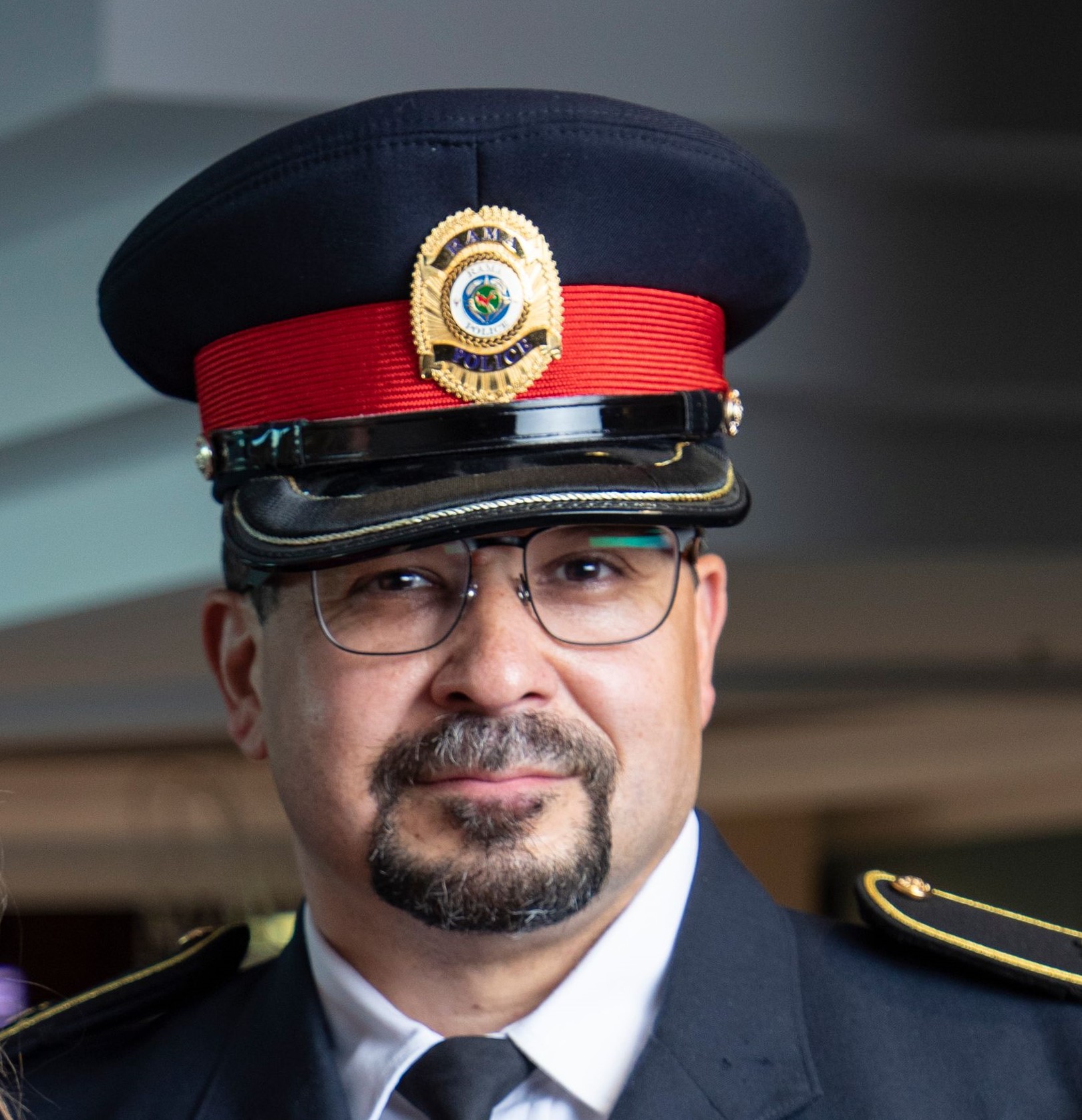
Inspector Tom Batisse is a member of the Rama Police Service and has been a police officer for the past 29 years. Prior to the Rama Police Service, Insp. Batisse served his home community of Matachewan First Nation, situated in Northern, Ontario. It was there that he started his policing career, prior to relocating to the Rama Police Service some 25 years ago. Throughout his policing career, he has specialized in a variety positions, such as Radar Instructor, Scenes of Crime Officer, Qualified Breath Technician, Marine Operator, Motor Officer, Records Management Instructor, Patrol Sergeant, Operational Staff Sergeant, and finally Inspector which is currently second in command to the Chief of Police. Insp. Batisse is the recipient of the 20-year service medal from the First Nation Chiefs of Police Association, the Police Exemplary Service Medal, and the Queen Elizabeth II Diamond Jubilee Medal.
Plenary Session: Opening Ceremony
Justin QuaidooTraining Officer, MFES | Captain, OC 47 Sqn, 32CER, CAF
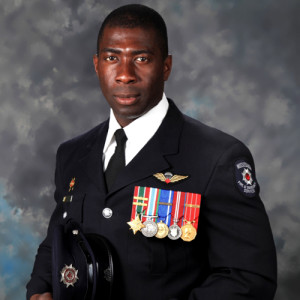
Justin Quaidoo is a highly accomplished professional who currently serves as a Training Officer for Mississauga Fire and Emergency Services. Prior to his current role, Justin served as a Firefighter at two fire stations in Mississauga. Justin's outstanding performance and unwavering dedication to his job were recognized in 2018 when he was awarded the prestigious title of Mississauga Firefighter of the Year, following an off-duty response that saved a person's life.
In addition to his exemplary service with the Mississauga Fire and Emergency Services, Justin is also an active member of the Canadian Armed Forces, holding the rank of Captain and serving as Officer Commanding a Squadron with the 32 Combat Engineer Regiment. Justin has received numerous awards and recognitions throughout his career, including the Queen's Diamond Jubilee award and the USA Army Commendation Medal, which he earned for his outstanding performance during his tour in Afghanistan.
Justin's extensive military service includes three operational tours of duty, including two tours in Afghanistan from 2008 to 2009 and 2010 to 2011, respectively, as well as a tour in Bosnia from January to July 1997. Justin's remarkable achievements in both his military and civilian roles speak to his exceptional leadership, dedication, and commitment to serving his community and his country.
Plenary Panel Session: Supporting the Mental Health of our First Responders, Leadership to the Frontlines
The purpose of this panel discussion is to explore some of the particular concerns relating to leadership and frontline workers across First Responder Organizations. The panel we discuss potential strategies for addressing mental health concerns in both populations as well as mitigating risks.
Assistant Commissioner Ches ParsonsCommanding Officer National Division, Royal Canadian Mounted Police
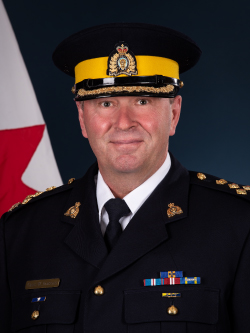
Assistant Commissioner Ches W. Parsons was appointed Commanding Officer of the National Division RCMP in August 2021, returning to the National Capital Region after serving three years as the Commanding Officer of the B Division RCMP in his home province of Newfoundland and Labrador.
Born and raised in Curling, Newfoundland, he graduated from Herdman Collegiate in Corner Brook, and then from Memorial University with a Bachelor of Commerce degree. He attended the RCMP Academy at Depot in Regina, Saskatchewan, in 1987, and was first posted to Fort McMurray, Alberta.
His career has taken him across Canada and internationally, including postings in Alberta, the Northwest Territories, Ontario, Newfoundland, and international deployments to Europe, Africa, the Middle East and the Far East. His operational policing roles have included Serious and Organized Crime, National Security, and Major Crimes. He was also a member and Team Commander of the Emergency Response Team in Yellowknife for some ten years, and worked in the field of national security for 17 years, most recently as the Director General of Federal Policing National Security in Ottawa.
With a strong commitment to collaboration and bringing people together, Assistant Commissioner Parsons dedicated many years to working with Alberta’s First Nations and Métis communities, as well as Indigenous communities in the Northwest Territories. He is a lifelong volunteer with a number of community organizations, a proud member of the Royal Canadian Legion, and an avid supporter of the Make-A-Wish Foundation.
As Commanding Officer, he places high value on promoting and facilitating employee health and well-being, as well as on ensuring RCMP police officers have the equipment, tools and support they need to remain leaders in excellence in policing, safeguarding the safety of Canadians and protecting our country’s national interests.
Workshop Session: The Journey Through Mental Health and Addiction Treatment for First Responders in Ontario - The Role of Inpatient Treatment in the Continuum of Care
It is widely known that Public Safety Personnel (PSP) are frequently exposed to traumatic events throughout their careers. The impact of this exposure can often have lasting consequences on PSP's mental health and functional ability on and off shift. These consequences may include the development of Post-Traumatic Stress Disorder, Depression, Anxiety, Substance Use Disorders and other debilitating mental health conditions, thus requiring intensive treatment. This session will explore the role of inpatient treatment in the treatment of these conditions in the context of the continuum of care available to PSP in Canada. The psychological, psychosocial and medical components of inpatient treatment will be discussed with an emphasis on receiving the right treatment at the right time.
Conference Date
May 17, 2023
7:30am - 5:00pm EST
Location
The International Centre
6900 Airport Road
Mississauga, Ontario
For more information contact events@THP.ca
